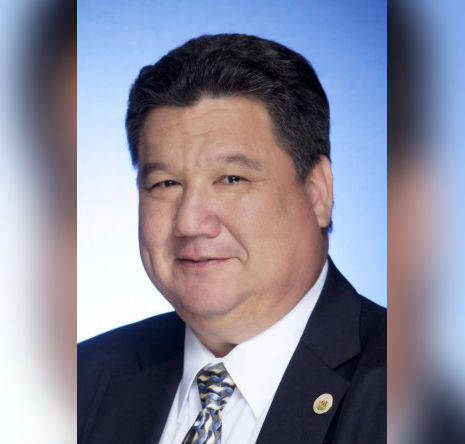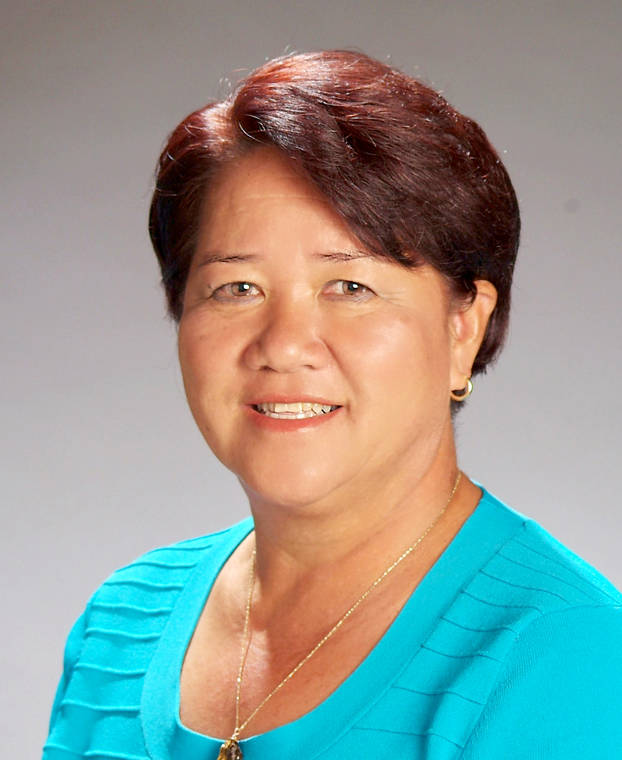LIHUE — State Rep. Jimmy Tokioka summed up the 2019 legislative session like this:
“It wasn’t home runs for us this year, but I would categorize it as a lot of singles,” he said.
Tokioka, along with state Reps. Dee Morikawa and Nadine Nakamura, and state Senate President Ron Kouchi, his right arm in a sling due to rotator-cuff surgery, gave their annual session summary at Thursday’s Lihue Business Association meeting.
They talked about the proposed minimum-wage bill, the North Shore’s continuing recovery, vaping, affordable housing and success with capital improvement project funding.
“We will continue to do good for our island,” Morikawa said to the crowd of about 60 people at Duke’s Canoe Club restaurant at the Kauai Marriott Resort &Beach Club.
Nakamura said a priority was the North Shore. Residents there are concerned about traffic congestion with the pending reopening of Kuhio Highway beyond Hanalei, which has been closed due to damage since the April 2018 flooding.
The potential problems with illegally parked cars on both sides of the narrow highway has been heightened as residents there “started seeing what it was like to reclaim their community.”
“This is what I consider one of the hot spots,” Nakamura said.
One part of the solutions is a bill that increases fines for illegal parking to $200 from $35. The funds from those fines, she added as the crowd applauded, will be split between the state highway fund and the county’s law enforcement agency.
“This is a model I would like to see in other areas,” she said.
Tokioka explained why he was against the proposed minimum-wage bill that would have increased the minimum wage to $15.10 an hour over five years.
“It all sounds good, let’s raise it to $15,” he said.
But he said the impacts on restaurants would be significant, including higher prices and fewer jobs.
He recounted a story of a friend who runs a restaurant who said this about increasing the minimum wage: “It’s going to hurt the small folks.”
Tokioka said many stores hire people with disabilities but might not be able to afford to continue to do that if wages climb too high.
“Those are the unintended consequences,” he said.
He said in Honolulu, more than 100 restaurants opened in the last two years — and more than 200 closed.
“And that’s even before this minimum wage,” he said.
While supporting the concept of higher wages in general, Tokioka said, “I think that it’s something we need to strive for, but we have to be very, very careful.”
He said he voted no on every minimum-wage proposal that came before legislators.
“I wasn’t satisfied the people we wanted to help were going to get help,” he said.
Capital improvement projects were a highlight for Kauai’s legislators.
Before the House of Representatives adjourned its 2019 session, it passed $89.1 million in CIP funding for fiscal year 2020 and 2021 for projects across Kauai County.
Those projects included:
w $3 million for Kapaa High School;
w $2 million for Kekaha School;
w $8.7 million to the Kauaʻi Region of the Hawaii Health Systems Corporation;
w $12.2 million total for the Kalaheo-Lawai-Omao Water System for improvements, provided the county provides matching funds equaling 20 percent of the state funds;
w $23 million total for Lihue Airport improvements;
w $15 million total for Nawiliwili Harbor improvements;
w $4 million total for Port Allen Harbor improvements;
Kouchi spoke of strong partnerships between agencies, government and legislators for that success.
Despite having the smallest delegation at the Legislature, and despite not agreeing on everything, Kauai’s legislators got things done for the island and its people, he said.
“The only way to achieve that goal is for us to work together,” he said.
Legislators were asked about taking steps to prevent youth from using vaping devices, referred to at the meeting as a “rising epidemic.”
“We know we have an epidemic of elementary and middle school students who are using vaping devices regularly,” said Tommy Noyes.
“It is a huge problem, not just in our state, but in our nation,” Nakamura said, who voted for a ban on flavored vaping products, which did not pass this year.
It will likely be brought up again next year.
“It’s hard to fix it in one legislative session,” Tokioka said.
“You’ve got our 100 percent support on this issue,” Kouchi said.
On trying to create affordable housing, Kouchi said, “the key is to have shovel-ready projects.”
The county and the state need to look at new strategies.
“Whatever we’ve done hasn’t worked,” he said.
Tokioka said they want community groups to present specific proposals they would like to see their legislators work on.
“Hopefully, we can help achieve some of those goals,” he said.
Legislators heard about 3,000 bills during the sessions, but fewer than 300 passed into law.
“There are thousands of things people are concerned about,” Tokioka said.
•••
Bill Buley, editor-in-chief, can be reached at 245-0457 or bbuley@thegardenisland.com.








Aloha Kakou,
Mahal Nui to our 4 Legislators not only for the $ gains they have brought back to Kauai each year, but also for the time they have to spend way from home here on Kauai…and worse the countless hours they must spend on meetings about
improvements to the other islands that must not be a precious time priority for each of our 4 hard workers but must be done in order to “bring the bacon home” for All of us on Kauai.
Mahalo you guys…!
As a tiny taxpayer on Kauai, I’m sure we are all grateful for the $$$ coming back to Kauai for our schools and our 2 State Hospitals, Mahelona above Kapa’a, and Kauai Veterans in Waimea, who accept all patients whether they have insurance or money or not; as well as $$$ to our schools and airport. I am curious though just what those million$ will be spent on each year. For instance at the schools is it student (and teacher) Health promoting physical activity equipment and facilities for the students, like sports, hula, swimming, teaching of yoga, languages, and cooking healthy foods; or will it pay for herbicides sprayed on school grounds and other negative things that are known to bring sickness and shorter lives to our children. Will the $$$ from Honolulu bring productive jobs of good things to our students while employing family members in the community?
And what will be done at the airport, will it be jobs or new construction or both?
And mahalo Rep. Nakamura for bringing up this VAPING scourge against our youth. Vaping is a serious issue and to think it is going on in elementary schools and above is frightening and proof positive that youth early on, as in elementary school entry level, need to be taught about their bodies to know not only the function and parts of them, but also the extreme delicate value of them and how to protect those parts and functions for a long healthy active life.
The Strength of our youth is not only that manifested on the football field, but also at the cellular level as in protecting those cells by not putting cancer causing (petroleum based petrochemicals) flavors directly into the comparatively weak lung cells, ALVEOLAE (they absorb the smoke of any kind ), and from there the E-cigarette cancer-causing flavors directly go to the blood stream to be distributed to every part of the body where the building blocks of cancer will be laid to ruin that young person’s life early on, or even decades later, as cancer has proven to weave its deadly trap in the human tissues made up by our cells…tumors are not cool to own or possess. In fact, the possession of cancer or its cause should be against the law. How’s that for new legislation?
An honest society, not corrupt by a political lobbying system, would crush E-cigarette VAPING in a single legislative session; not condone it by lack of terminating it.
The words ”Follow the $$$” are the key words here. It may be that Ron, and Dee and Jimmie, and Nadine are doing their all and best to protect our foolish youth, as some youth would be, but their efforts are squashed in back room ongoings in Honolulu by very big money lobbyists cutting deals not in our youths best interest.
You see whatever else is going on with E-cigarettes, that may be part of the profit fringe of Big Tobacco, is the industry that makes flavors in everything from drinks to food to aromas, those flavors for the most part are made from petroleum, that is from oil wells and coal mines, petroleum (just like gas and oil) which is converted into petrochemicals that are made into flavors that go into E-cigarettes. The base ingredients of flavors are petroleum which is carcinogenic, that is, cancer causing.
If our youth were educated about their bodies less of them at least would do harmful things to themselves like E-cigarettes, alcohol, and tobacco…and junk food which lacks nutrition, and accumulates heart disease and stroke, obesity, diabetes, and other cancers in humans.
Some E-cigarettes contain menthol we’ve heard, which may even be from natural sources but are known to be not only menthol addictive and bad for ones health and also causes lung congestion.
Nature has put Oxygen in the air we breathe and it is so essential to our precious life that a few minutes without oxygen means death. For those living on the windward sides of the Hawaiian Islands, we have some of the purest air and oxygen in the entire world. To polllute the ALVEOLAE OF OUR LUNGS, and therefore our whole bodies, with E-cigarettes and their carcinogenic, cancer causing petrochemicals is a slap in the face to Nature and to God’s gift to us all…that gift from God is our incredible bodies.
There is so much bad, sickness, and future disease that comes from smoking anything, and so much bad to be said about E-cigarettes, that may we implore and humbly and astoundingly ask and urge Ron, Dee, Jimmie, and Nadine to put a ban on E-cigarettes in the next legislature, and while they are at it they may as well include all tobacco and smoking of anything in the ban.
After all to most of us, HAWAII means HEALTH…JUST LIVE IT…!